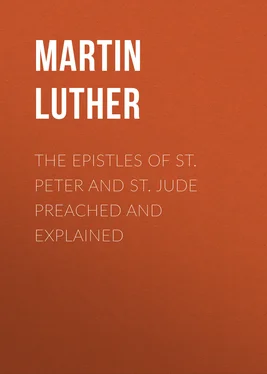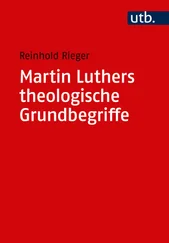Martin Luther - The Epistles of St. Peter and St. Jude Preached and Explained
Здесь есть возможность читать онлайн «Martin Luther - The Epistles of St. Peter and St. Jude Preached and Explained» — ознакомительный отрывок электронной книги совершенно бесплатно, а после прочтения отрывка купить полную версию. В некоторых случаях можно слушать аудио, скачать через торрент в формате fb2 и присутствует краткое содержание. Жанр: foreign_prose, foreign_religion, Философия, foreign_psychology, foreign_antique, на немецком языке. Описание произведения, (предисловие) а так же отзывы посетителей доступны на портале библиотеки ЛибКат.
- Название:The Epistles of St. Peter and St. Jude Preached and Explained
- Автор:
- Жанр:
- Год:неизвестен
- ISBN:нет данных
- Рейтинг книги:5 / 5. Голосов: 1
-
Избранное:Добавить в избранное
- Отзывы:
-
Ваша оценка:
- 100
- 1
- 2
- 3
- 4
- 5
The Epistles of St. Peter and St. Jude Preached and Explained: краткое содержание, описание и аннотация
Предлагаем к чтению аннотацию, описание, краткое содержание или предисловие (зависит от того, что написал сам автор книги «The Epistles of St. Peter and St. Jude Preached and Explained»). Если вы не нашли необходимую информацию о книге — напишите в комментариях, мы постараемся отыскать её.
The Epistles of St. Peter and St. Jude Preached and Explained — читать онлайн ознакомительный отрывок
Ниже представлен текст книги, разбитый по страницам. Система сохранения места последней прочитанной страницы, позволяет с удобством читать онлайн бесплатно книгу «The Epistles of St. Peter and St. Jude Preached and Explained», без необходимости каждый раз заново искать на чём Вы остановились. Поставьте закладку, и сможете в любой момент перейти на страницу, на которой закончили чтение.
Интервал:
Закладка:
St. Peter, therefore, would here say, if you would remain chaste, then must you render obedience to the truth in the Spirit, that is,—we must not only read and hear the word of God, but apprehend it in our hearts. Therefore it is not enough that a man should preach or hear the Gospel once, but he must ever press after it and persevere; for such grace does the word possess, that the more we taste it the more delightful it is; although there is, throughout, one and the same doctrine of faith, yet it cannot be listened to too much where the heart is not wanton and untamed.
To unfeigned love of the brethren. To what end, then, are we to live a chastely holy life? In order that we may be saved thereby? No! but in order that we may be useful to our neighbor. What am I to do that I may restrain my sin? I am to have obedience to the truth in the Spirit. But why am I to restrain it? In order that I may be of service to others, for I must first control my body and the flesh by the Spirit, and thus I can afterward be of service to others.—It follows further:
And have fervent love toward one another out of pure hearts. The Apostles Peter and Paul distinguish brotherly love, and love in general, from one another. Brotherhood is, that Christians should dwell altogether as brethren, and make no distinctions between themselves. For since we all have a common Christ, one baptism, one faith, one treasure, I am no better than thou; that which thou hast, I have also, and I am just as rich as thou. The treasure is the same, except that I may have it in a better shape than thou, since I may have it lying in gold, but thou in a poor garment. Therefore as we have the grace of Christ and all spiritual blessings in common, so should we also hold body and life, property and honor, in common, that one should be of service to another in all things.
Here he speaks plainly: in unfeigned brotherly love . The Apostles love to make use of the word, but have clearly perceived that were we called Christians and brethren universally one with another, it would be false, a feigned or imagined thing, and would be only hypocrisy. We have many brotherhoods set up in the world, but they are vain deceptions and corruptions, which the devil has devised and brought into the world, which are only antagonist to the true faith and to genuine brotherly love. Christ is mine as well as St. Bernard's; thine as well as St. Francis'; if one therefore should come to you and say, I shall go to heaven if I belong to this or that brotherhood, then tell him that he is deceived; for Christ cannot suffer, and will not allow any other than the common brotherhood, which we all have one with another; yet you come here, you fool, and will set up one of your own. This I will readily permit, that they be set up, not to help the soul, but as some one's endowment, and thus serve as a fund from which they who need shall be helped.
Thus we all of us, as Christians, have attained a brotherhood in baptism, whereof no saint possesses more than I or you. For just as costly as that one was purchased, at the same price was I also purchased. God has devoted as much toward me as to the greatest saint, except that he may have employed the treasure better, and may have a stronger faith than I.
But love is greater than brotherhood, for it extends even to our enemies, and especially to those who are not worthy of love. For as faith performs its work where it sees nothing, so also should love see nothing, and there especially exercise its office where there appears nothing lovely, but only disaffection and hostility. Where there is nothing that pleases me I should the more seek to be pleased. And this spirit should go forth fervently, says St. Peter, from the whole heart, just as God loved us when we were not worthy of love.—Now follows further:
As those who have been born again. Again we should do this, because we are not what we were before (he says), but have become new creatures. This has not come to pass through works, but is a consequence of the new birth. For thou canst not make the new man, but he must grow, or be born; as a husbandman cannot make a tree, but it must grow, itself, out of the earth, and as we certainly do not become the children of Adam, except as we are born and derive sin from our parents. So here it cannot come to pass through works that we should become the children of God, but we must also experience the new birth. This, therefore, is what the Apostle would say: since ye then have become new creatures, ye should conduct yourselves otherwise than ye did, and lead a new life. As ye before lived in hate, ye are now to walk in love—in all respects the reverse. But how has the new birth taken place? This, also, follows:
V. 23. Not of corruptible, but of incorruptible seed, even of the living word of God which endures for ever. Through a seed are we born again, for nothing grows as we see otherwise than through seed. Did the old birth spring from a seed? then must the new birth also spring from a seed. But what is this seed? Not flesh and blood! What then? It is not corruptible, but an eternal word. It is, moreover, that whereon we live,—food and nourishment. But especially is it the seed whereby we are born again, as he here says.
But how does this take place? After this manner: God lets the word—the Gospel—go forth, and the seed falls in the hearts of men, and wherever it fastens on the heart the Holy Spirit is present, and makes a new man; then the man becomes another, of other thoughts, of other words and works. Thus you are entirely changed. All that you before avoided you now seek out, and what you before sought after that you fly from. In respect to the birth of the body, it is the case that when conception takes place the seed is changed, so that it is seed no longer. But this is a seed which cannot be changed; it remains for ever; it changes me, so that I am transformed in it, and whatever is evil in me passes away from my nature. Therefore it is indeed a wonderful birth, and of extraordinary seed.—Now St. Peter says, further:
V. 24, 25. For all flesh is grass, and all the glory of man like the flower of grass; the grass withereth, and the flower thereof falleth away, but the word of the Lord endureth for ever. This passage is taken from the prophet Isaiah, xl., where the prophet speaks in this manner: "Cry! what shall I cry? Cry thus: all flesh is grass, and all its glory like a flower of the field; the grass withereth and the flower falleth away, but the word of God endureth for ever." These words St. Peter introduces here; for this is, as I have said, a rich epistle, and well spiced with Scripture.
Thus speaks the Scripture, then: The word of God endures for ever. What is flesh and blood is corruptible, like the grass which is yet green, so that it blooms; so whatever is rich, strong, wise and fair, and thus is flourishing (which all belongs to the bloom), yet you observe its bloom wither; what was young and vigorous will become old and ugly; what is rich will become poor, and the like. And all must fall by the word of God. But this seed cannot perish.—Now Peter concludes:
This is the word which is preached unto you. As though he would say, ye are not to look far in order to reach the word of God; ye have it before your eyes; the word is that which we preach; therewith may you subdue all evil lusts. You are not to seek it from afar; you have nothing more to do than fully to apprehend it when it is preached. For it is so near us that we may hear it, as Moses also says, in Deut. xxx.: "The word that I command you is not far from thee, that thou must go therefor far away; ascend into heaven or go beyond the sea, but it is near thee, even in thy mouth and in thy heart." It is indeed soon spoken and heard. But if it enters our hearts it cannot die or perish, and will not suffer you to perish; as long as you cleave to it, it will cleave to you.
Читать дальшеИнтервал:
Закладка:
Похожие книги на «The Epistles of St. Peter and St. Jude Preached and Explained»
Представляем Вашему вниманию похожие книги на «The Epistles of St. Peter and St. Jude Preached and Explained» списком для выбора. Мы отобрали схожую по названию и смыслу литературу в надежде предоставить читателям больше вариантов отыскать новые, интересные, ещё непрочитанные произведения.
Обсуждение, отзывы о книге «The Epistles of St. Peter and St. Jude Preached and Explained» и просто собственные мнения читателей. Оставьте ваши комментарии, напишите, что Вы думаете о произведении, его смысле или главных героях. Укажите что конкретно понравилось, а что нет, и почему Вы так считаете.












